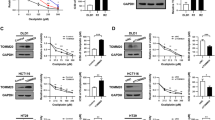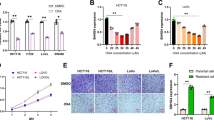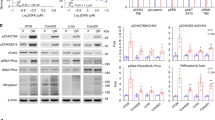Abstract
We aimed to understand the molecular mechanism underlying the incidence of Oxaliplatin resistance in colorectal cancer. The Oxaliplatin-resistant (OR) HT29 colorectal cell line was established by long-term exposure to Oxaliplatin. Cell viability and proliferation were determined by the 3-(4,5-dimethyl thiazol-2-yl)-2,5-diphenyltetrazolium bromide and direct counting assays, respectively. Transcript level of metallothionein 2A (MT2A) was measured by real-time polymerase chain reaction. Protein levels of MT2A, BRCA1-associated RING domain 1 (BARD1), BRCA1, and β-actin were quantified by immunoblotting. Direct interaction between MT2A with BARD1 and BRCA1 was analyzed by co-immunoprecipitation. Colocalization between of MT2A and BARD1 was determined by immunofluorescence. MT2A was upregulated in OR cells at both transcript and protein levels. Knockdown of MT2A in HT29 OR cells improved sensitivity to Oxaliplatin, while ectopic overexpression of MT2A conferred HT29 cells relative resistance to Oxaliplatin. We further demonstrated that MT2A interacted with and positively regulated BARD1/BRCA1 in colorectal cancer cells. BARD1 overexpression partially restored the compromised Oxaliplatin resistance elicited by MT2A deficiency in terms of both cell proliferation and viability. Our data highlighted the critical contributions of MT2A-BARD1/BRCA1 in Oxaliplatin resistance in colorectal cancer cells.




Similar content being viewed by others
References
Dekker, E., Tanis, P. J., Vleugels, J. L. A., Kasi, P. M., & Wallace, M. B. (2019). Colorectal cancer. Lancet, 394, 1467–1480.
Siegel, R. L., Miller, K. D., & Jemal, A. (2019). Cancer statistics, 2019. A Cancer Journal of Clinicians, 69, 7–34.
Obaro, A. E., Plumb, A. A., Fanshawe, T. R., Torres, U. S., Baldwin-Cleland, R., & Taylor, S. A., et al. (2018). Post-imaging colorectal cancer or interval cancer rates after CT colonography: a systematic review and meta-analysis. The Lancet Gastroenterology and Hepatology, 3, 326–336.
Kuipers, E. J., & Lansdorp-Vogelaar, I. (2017). Colorectal cancer screening in Australia. Lancet Public Health, 2, e304–e305.
Bopanna, S., Ananthakrishnan, A. N., Kedia, S., Yajnik, V., & Ahuja, V. (2017). Risk of colorectal cancer in Asian patients with ulcerative colitis: a systematic review and meta-analysis. The Lancet Gastroenterology and Hepatology, 2, 269–276.
Thavanesan, N., Abdalkoddus, M., Yao, C., Lai, C. W., & Stubbs, B. M. (2018). Management of patients with incurable colorectal cancer: a retrospective audit. Colorectal Disease, 20, 864–872.
Graham, J., Mushin, M., & Kirkpatrick, P. (2004). Oxaliplatin. Nature Reviews Drug Discovery, 3, 11–12.
Moertel, C. G. (1994). Chemotherapy for colorectal cancer. The New England Journal of Medicine, 330, 1136–1142.
Kouroussis, C., Souglakos, J., Kakolyris, S., Mavroudis, D., Malamos, N., & Kalbakis, K., et al. (2001). Oxaliplatin in combination with infusional 5-fluorouracil and leucovorin every 2 weeks as first-line treatment in patients with advanced colorectal cancer: a phase II study. Oncology, 61, 36–41.
Hsu, H. H., Chen, M. C., Baskaran, R., Lin, Y. M., Day, C. H., & Lin, Y. J., et al. (2018). Oxaliplatin resistance in colorectal cancer cells is mediated via activation of ABCG2 to alleviate ER stress induced apoptosis. Journal of Cellular Physiology, 233, 5458–5467.
Buss, I., Hamacher, A., Sarin, N., Kassack, M. U., & Kalayda, G. V. (2018). Relevance of copper transporter 1 and organic cation transporters 1-3 for oxaliplatin uptake and drug resistance in colorectal cancer cells. Metallomics, 10, 414–425.
Hu, H., Yang, L., Li, L., & Zeng, C. (2018). Long non-coding RNA KCNQ1OT1 modulates oxaliplatin resistance in hepatocellular carcinoma through miR-7-5p/ ABCC1 axis. Biochemical and Biophysical Research Communications, 503, 2400–2406.
Shen, L., Dong, X., Wang, Y., Qiu, L., Peng, F., & Luo, Z. (2018). beta3GnT8 regulates oxaliplatin resistance by altering integrin beta1 glycosylation in colon cancer cells. Oncology Reports, 39, 2006–2014.
Zhang, Y., Huang, L., Shi, H., Chen, H., Tao, J., & Shen, R., et al. (2018). Ursolic acid enhances the therapeutic effects of oxaliplatin in colorectal cancer by inhibition of drug resistance. Cancer Science, 109, 94–102.
Liu, Y., Zheng, X., Yu, Q., Wang, H., Tan, F., & Zhu, Q., et al. (2016). Epigenetic activation of the drug transporter OCT2 sensitizes renal cell carcinoma to oxaliplatin. Science Translational Medicine, 8, 348ra397.
Ivanova, T., Zouridis, H., Wu, Y., Cheng, L. L., Tan, I. B., & Gopalakrishnan, V., et al. (2013). Integrated epigenomics identifies BMP4 as a modulator of cisplatin sensitivity in gastric cancer. Gut, 62, 22–33.
Roodhart, J. M., Daenen, L. G., Stigter, E. C., Prins, H. J., Gerrits, J., & Houthuijzen, J. M., et al. (2011). Mesenchymal stem cells induce resistance to chemotherapy through the release of platinum-induced fatty acids. Cancer Cell, 20, 370–383.
Lim, D., Jocelyn, K. M., Yip, G. W., & Bay, B. H. (2009). Silencing the Metallothionein-2A gene inhibits cell cycle progression from G1- to S-phase involving ATM and cdc25A signaling in breast cancer cells. Cancer Letters, 276, 109–117.
Yamasaki, M., Nomura, T., Sato, F., & Mimata, H. (2007). Metallothionein is up-regulated under hypoxia and promotes the survival of human prostate cancer cells. Oncology Reports, 18, 1145–1153.
Liu, D., Wang, M., Tian, T., Wang, X. J., Kang, H. F., & Jin, T. B., et al. (2017). Genetic polymorphisms (rs10636 and rs28366003) in metallothionein 2A increase breast cancer risk in Chinese Han population. Aging, 9, 547–555.
Pan, Y., Lin, S., Xing, R., Zhu, M., Lin, B., & Cui, J., et al. (2016). Epigenetic upregulation of Metallothionein 2A by diallyl trisulfide enhances chemosensitivity of human gastric cancer cells to docetaxel through attenuating NF-kappaB activation. Antioxidants & Redox Signaling, 24, 839–854.
Kim, H. G., Kim, J. Y., Han, E. H., Hwang, Y. P., Choi, J. H., & Park, B. H., et al. (2011). Metallothionein-2A overexpression increases the expression of matrix metalloproteinase-9 and invasion of breast cancer cells. FEBS Letters, 585, 421–428.
Lee, H. S., Lee, S. Y., Ha, H. L., Han, D. C., Han, J. M., & Jeong, T. S., et al. (2009). 2’-Benzoyloxycinnamaldehyde inhibits tumor growth in H-ras12V transgenic mice via downregulation of metallothionein. Nutrition and Cancer, 61, 723–734.
Yap, X., Tan, H. Y., Huang, J., Lai, Y., Yip, G. W., & Tan, P. H., et al. (2009). Over-expression of metallothionein predicts chemoresistance in breast cancer. The Journal of Pathology, 217, 563–570.
El Khoury, F., Corcos, L., Durand, S., Simon, B., & Le Jossic-Corcos, C. (2016). Acquisition of anticancer drug resistance is partially associated with cancer stemness in human colon cancer cells. International Journal of Oncology, 49, 2558–2568.
Woods, N. T., Mesquita, R. D., Sweet, M., Carvalho, M. A., Li, X., & Liu, Y., et al. (2012). Charting the landscape of tandem BRCT domain-mediated protein interactions. Science Signaling, 5, rs6.
Xia, Y., Pao, G. M., Chen, H. W., Verma, I. M., & Hunter, T. (2003). Enhancement of BRCA1 E3 ubiquitin ligase activity through direct interaction with the BARD1 protein. Journal of Biological Chemistry, 278, 5255–5263.
Wu, J. Y., Vlastos, A. T., Pelte, M. F., Caligo, M. A., Bianco, A., & Krause, K. H., et al. (2006). Aberrant expression of BARD1 in breast and ovarian cancers with poor prognosis. International Journal of Cancer, 118, 1215–1226.
Liao, Y., Yuan, S., Chen, X., Zhu, P., Li, J., & Qin, L., et al. (2017). Up-regulation of BRCA1-associated RING Domain 1 promotes hepatocellular carcinoma progression by targeting Akt signaling. Scientific Reports, 7, 7649.
Sporn, J. C., Hothorn, T., & Jung, B. (2011). BARD1 expression predicts outcome in colon cancer. Clinical Cancer Research, 17, 5451–5462.
Irminger-Finger, I. (2010). BARD1, a possible biomarker for breast and ovarian cancer. Gynecologic Oncology, 117, 211–215.
Zhu, Y., Liu, Y., Zhang, C., Chu, J., Wu, Y., & Li, Y., et al. (2018). Tamoxifen-resistant breast cancer cells are resistant to DNA-damaging chemotherapy because of upregulated BARD1 and BRCA1. Nature Communications, 9, 1595.
Funding
This study was supported by Science and Technology Fund of Tianjin Health Bureau (2014KZ123).
Author information
Authors and Affiliations
Corresponding author
Ethics declarations
Conflict of Interest
The authors declare that they have no conflict of interest.
Additional information
Publisher’s note Springer Nature remains neutral with regard to jurisdictional claims in published maps and institutional affiliations.
Supplementary information
Rights and permissions
About this article
Cite this article
Zhao, Z., Zhang, G. & Li, W. MT2A Promotes Oxaliplatin Resistance in Colorectal Cancer Cells. Cell Biochem Biophys 78, 475–482 (2020). https://doi.org/10.1007/s12013-020-00930-5
Received:
Accepted:
Published:
Issue Date:
DOI: https://doi.org/10.1007/s12013-020-00930-5




